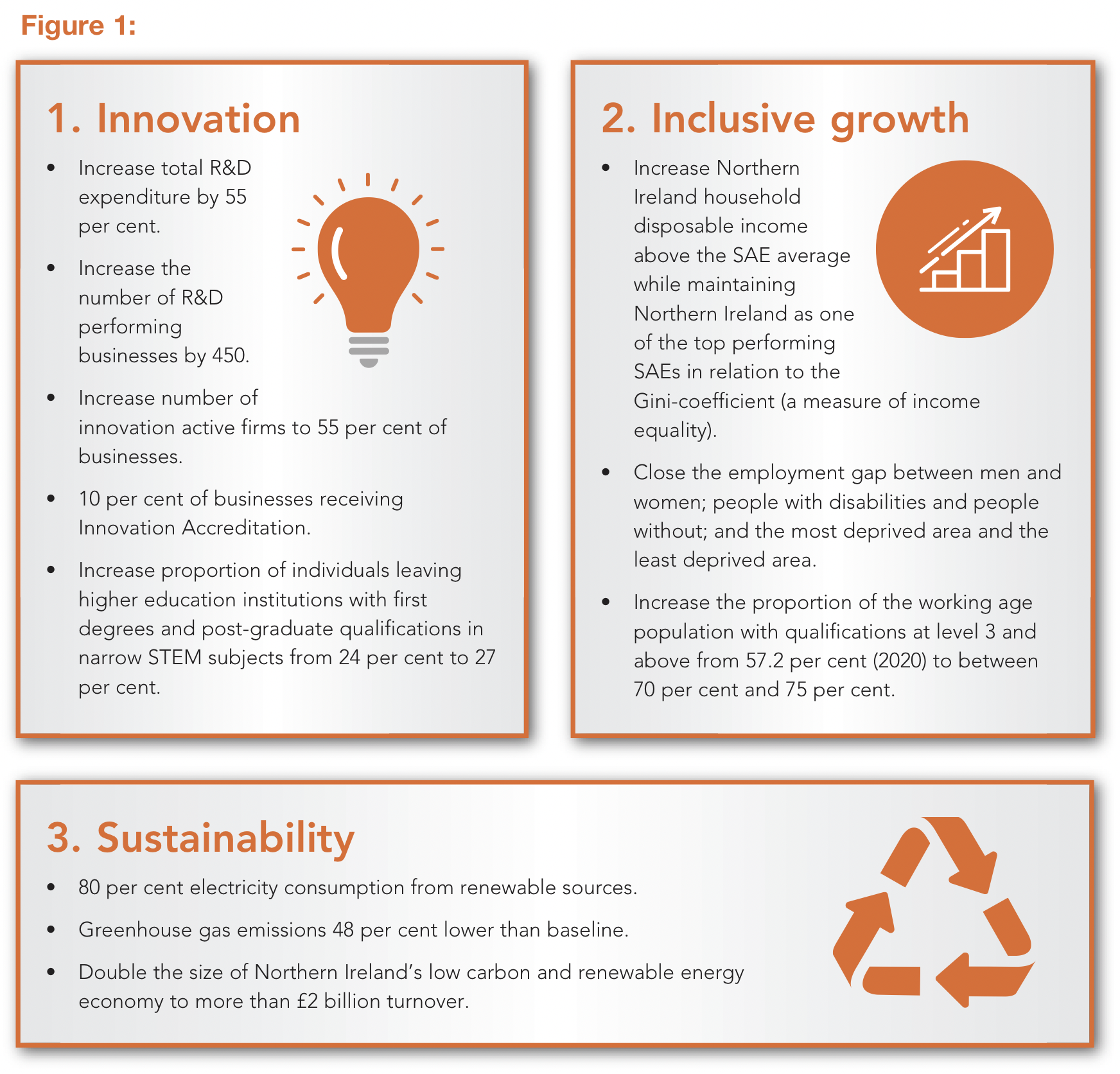10X Delivery Plan 2023/24

In an unprecedented move, officials in the Department for the Economy (DfE) have opted to publish an economic action plan for the year ahead, aiming to balance growth ambitions with real time budget cuts.
Published in July 2023, in the absence of a minister, the 10X Delivery Plan 2023/24 is framed as a work schedule for the year ahead for the Department and partner organisations in what Permanent Secretary Mike Brennan describes as “administrative difficulties”.
Outlined as a “new way of business planning” for the Department, the delivery plan states the desire to bring greater transparency to policy delivery and the decision-making process in the absence of an Executive and Assembly.
In May 2021, then-Economy Minister Diane Dodds MLA published 10X Economy: An Economic Vision, for which delivery challenges have included Covid-19’s impact on staff resources and the absence of an originally envisaged multi-year budget, economic inflation, and the absence of the Northern Ireland Executive has seen the Secretary of State issue a restrictive budget. For the Department for the Economy, an allocation of £772 million Resource DEL (RDEL) and £246 million Capital DEL (CDEL) for 2023/24, represents a 1.3 per cent reduction against 2022/23.
The 10X Delivery Plan, in recognising the difficult budgetary position, aims to streamline investment towards those areas identified in the 10X economic strategy as priority sectors, due to their potential multiplying effect.
“We need to marry the economic opportunities to the economic problems we face,” the document states.
The region’s economic challenges are long-standing and identifiable. As well as possessing the UK’s highest rate of working-age economic inactivity for the past 30 years, Northern Ireland also boasts median wages of 8 per cent lower than the UK average (the lowest of the UK regions) and has the fewest people with third-level qualifications and more with no qualifications than the UK as a whole.
Perhaps most importantly, Northern Ireland’s productivity is one of the lowest of any UK regions, between 10 to 20 per cent below the UK average and some 40 per cent below that of the Republic of Ireland.
Highlighting that a significant proportion of the Department’s budget is directed towards Invest NI, as well as further and higher education institutions, the delivery plan calls for “major contributions from all three”.
Already underway is the implementation of the recommendations of a critical independent review of Invest NI, work on a review of the further education delivery model, and the development of outcome agreements for higher education institutions.
“The need to evaluate and review existing activities and policies and develop new policies and activities will involve significant development work including public consultation, for example on priority sectors, clusters, and technologies where we have not had a policy previously.”
The delivery plan encompasses only the work that will most directly contribute towards the achievement of 10X objectives and is sectioned on the “triple bottom line” of innovation, inclusive growth, and sustainability.
Beyond the outlined key objectives of the three key pillars outlined in Figure 1, the delivery plan outlines work across cross-cutting areas that will deliver against innovation, inclusive growth, and sustainability. Two new policy areas in the form of technologies, sectors and clusters and place are areas where the Department has not previously had a unified policy.
“10X highlights the need to focus on areas where Northern Ireland is, or can be, a global leader and a competitive small, advanced economy. These key clusters or sectors include life and health sciences, agri-tech, software and AI (including cyber), advanced manufacturing and engineering, low carbon, fintech/financial services, and screen industries (including virtual production).”
An additional focus is on addressing sub-regional differences, recognising that the Department has not previously directly applied a sub-regional policy focus to major policies and the need for a new strategic direction.
“Place provides us with the opportunity to create an approach which links regional 10X policy with sub-regional capital investment and local council economic development plans,” the plan states, pointing to actions of:
- a call for evidence to stakeholders with an ambition to consult on place policy during 2023/24;
- working with departmental policy colleagues and partner organisations to consider how further investment around the four City and Growth Deals could accelerate innovative growth of existing business and support new businesses to emerge; and
- work with council and community partners to assess how the Department can support local area plans to maximise potential and develop inclusive and sustainable economic eco-systems.
Finally, alongside a tourism strategy set to be consulted on during 2023/24, the Department has outlined planned work with stakeholders and delivery partners to develop a draft entrepreneurship strategy, set to go to public consultation in 2024/25.






